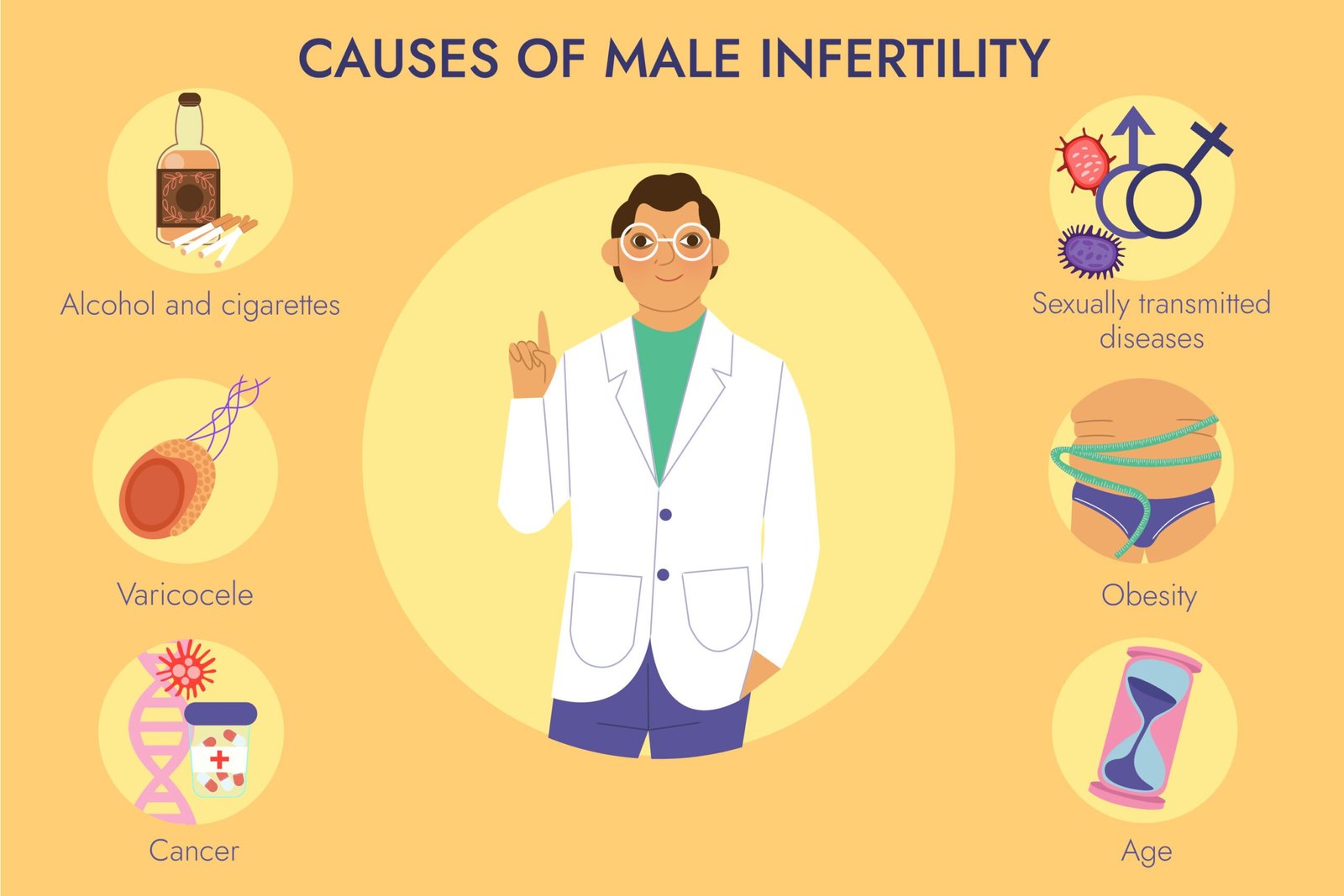Fertility issues historically have been linked to women only, however, studies now show that male fertility is also seeing a significant drop in both the quality and quantity of their sperm.
The fertility factors for men and women are quite different. For females, all the eggs she will have for her lifetime are present since birth. And it is believed that the quality and quantity of her eggs age with her. When discussing female fertility, age is a vital factor.
In contrast, males don’t have the risk of losing sperm with age like females. However, as per a study it has been found that fertility in males often begins to decline at the age of 40 to 45 years when sperm quality declines.
Sperm count declines appeared to be accelerated when study researchers limited their data to specific years, from an average of 1.16% per year after 1973 to 2.64% per year after 2020.

Male fertility decline is a serious issue that is emerging rapidly.
As per studies, it has been found that the most influencing factors for the decline in male fertility are lifestyle patterns, diet & nutrition, psychological stress, environmental exposure, technological advancements, etc.
Let’s learn about these factors in more detail.
Lifestyle Pattern
The way people live today has changed drastically. The lifestyle that they follow is sedentary, it includes unbalanced food habits, excessive stress levels, drug dependency, etc, which has led to an unorganized lifestyle leading to an increase in more rate of male fertility decline.
- Sedentary lifestyles are becoming more common in modern-day society. This is characterized by minimum physical activity and more sitting hours.
- Less physical activity can also lead to a reduction in blood flow to the testes which can impact the flow of oxygen and nutrients that are important for sperm growth.
- Less physical activity also leads to obesity resulting in a decline in sperm production and hormone disruption.
- An increase in the consumption of alcohol, cocaine, anabolic steroids, etc, leads to hormonal imbalance, sperm DNA damage, and a decline in the quality and quantity of sperm.
- Smoking affects male fertility too.
Diet & Nutrition
Diet & nutrition have an important role in fertility. Whether we talk about male fertility or female fertility. Practicing a healthy, balanced diet, rich in antioxidants and nutrients is what is getting lagged in males.
- Intaking high amounts of processed foods like sugary items, and junk foods leads to stress and inflammation that causes damage to sperm.
- Intaking saturated fats frequently like red meat, and fried foods causes hormonal imbalance that can affect sperm production.
- Drinking higher volumes of sugary drinks and not drinking enough water can cause bad-quality sperm.
How to increase fertility through diet?
Increase the consumption of a balanced diet rich in fruits, vegetables, whole grains, proteins, and healthy fats. Prioritize plant-based foods for their antioxidant content and choose healthy fats like those found in avocados and nuts. Limit processed foods, sugary snacks, caffeine, and alcohol, as they can negatively impact hormone levels and reproductive health. Stay hydrated, maintain a healthy weight, and consider supplementing with fertility-friendly vitamins and minerals under medical guidance.
Psychological Stress
In today’s busy schedule and hectic lifestyle, stress has become a constant factor that has impacted both the physical and mental health of a person. It’s essential to acknowledge the psychological aspect of stress on reproductive health otherwise it can create more difficult and stressful situations for couples who are trying to conceive.
- Chronic stress leads to the prolonged release of cortisol. This is also termed as the “stress hormone.” This hormone is essential for managing stress responses however it can be problematic when levels remain elevated for extended periods.
- Stress can disrupt the axis which is well known as the hypothalamic-pituitary-gonadal (HPG) axis that acts as a critical regulatory system in men for reproductive functioning. This can cause an imbalance in hormones that can affect the sperm count and fertility level.
- The cumulative effect of chronic stress on reproductive function can diminish fertility potential in men. Reduced sperm quantity and quality can make it more challenging for couples to conceive naturally, increasing the likelihood of infertility issues.

Environmental Exposure
In our day-to-day lives, we use a variety of products like personal hygiene products, plastic products, insecticides, etc, without knowing that they contain a chemical substance that tampers with our body’s hormonal systems. The chemical substance is called Endocrine-Disrupting Chemicals (EDCs).
- EDC exposure can lead to disruption in the male reproductive process.
- Studies show that EDC exposure can reduce sperm mortality and abnormal morphology.
- Semen quality can get reduced due to exposure to these chemicals, affecting fertility outcomes.
- To reduce exposure to EDC, researchers advise selecting items that are labeled as “BPA-free” or “EDC-free”.
Technological Advancement
While technology has made our life easy and flexible however male fertility may be in danger as a result of these advancements.
- Extensive use of electronic devices like laptops and smartphones exposes men to electromagnetic radiation.
- According to studies, sperm motility and production may suffer with prolonged exposure to this radiation.
Apart from the above-mentioned essential factors that cause a male fertility decline, there are a few more factors that are required to be taken into consideration while discussing the topic of male infertility.
- Medical conditions such as anatomical problems, chromosomal defects, sexually transmitted diseases, and serious illnesses caused due to some infections can also be a reason for male infertility condition.
- DNA fragmentation or we can say abnormalities in the sperm’s DNA can increase the chances of miscarriage.
- Problems during sexual intercourse as erectile dysfunction, premature ejaculation, etc, can be another cause.
- Major surgeries can also block the path of sperm such as prostrate surgeries, testicular surgeries, etc.
- Cancer medications, antifungal medications, testosterone replacement therapy, etc, can lead to damaged sperm production resulting in a decline in male fertility.

Why Male Fertility Decline Needs To Be Discussed And Understood ?
In our society, female fertility issues have always been a concerning topic however we usually forget that male fertility is also an integral part that needs a discussion. The reasons are quite simple and practical.
- Public health is significantly impacted by a decline in male fertility. Falling birth rates and the difficulties brought on by an aging population are just two social repercussions that could arise from lower fertility rates.
- When people are more aware of the causes of fertility either for males or females, they can make better decisions about their reproductive health.
- Potential challenges related to fertility can allow couples to explore options like adoption.
- Discussing male fertility decline openly reduces stigma and encourages individuals to seek support and coping strategies.
- Society can protect fertility and promote general well-being by putting preventive measures in place once the factors causing fertility loss are understood.
As a society or individuals, it is our responsibility to discuss and understand this concerning and emerging topic of male fertility and infertility so that we can create awareness for ourselves and society. Male reproductive health also needs attention for a better and healthy society.
